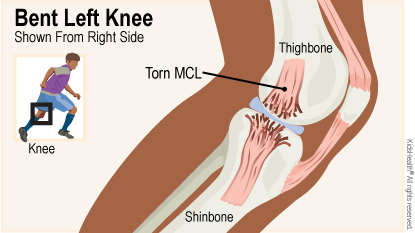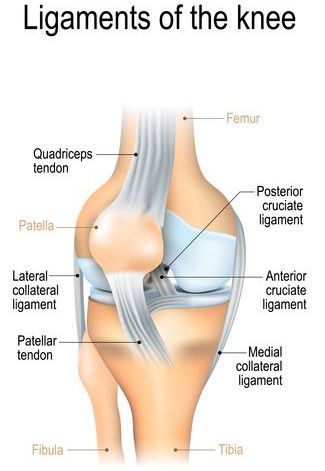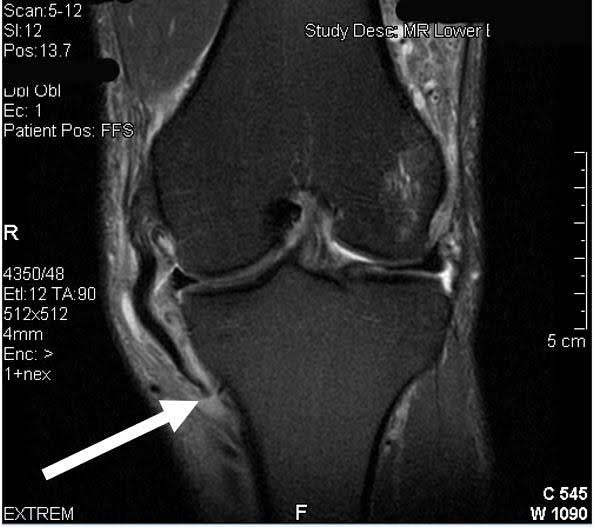Knee injuries are the most common injuries. But they are also common when it comes to
turning into a serious injury.
If you are hit by another player when you’re taking part in a game such that the side of your knee is hit, your MCL may get be bruised. The MCL (medial collateral ligament) is a band of tissue that runs at the inner edge of your knee. It connects your thighbone to the bone of your lower leg. Any injury or strain in the MCL causes loss of proper coordination between your lower and upper leg which turns out to be pretty painful.
When your MCL in the knee is bruised or torn, your knee will over-extend itself, or bend more than required to complete the required motion which is not desirable. Athletes are most common to get sports injuries, mainly in the knee areas, so it a must for them to use protection by wearing safety guards to stay protected.


Why are MCL Injuries common and what causes MCL injuries?
Medial collateral ligament is one of the most used ligaments of human body owing to the fact that is constitutes and is an important part of the human knee structure. The entire body seem to rest on the hip and knee portions of our body. The knee is responsible to carrying around the upper body almost the whole day.
Also, for people who engage in physical activities tend to use & rely a lot on their knee joints. It is also a reflex mechanism that gets activated for the lower body apart from hands. Injuries to such commonly used body vitals are common. However they should not be taken lightly.
The common causes of knee pain due to MCL injuries include the following-
1. A jump / fall, where the person lands on his /her knee in an awkward position. Common for volleyball players
2. Weightlifting or occupations which involve lifting of heavy weights like masons or even squatting
3. Hyperextension of knee for prolonged hours as in case of skiing
4. Weak knees like weak ligaments or prior injuries when overused may result in MCL injuries
The sock and ball joint, the human knee is made functional by several elastic muscles called the MCL. When these muscles lose their elasticity due to internal or external damage or repeated stress, we can expect MCL sprains & tears.


Symptoms
The easily visible indications include—
1. Severe knee pain
2. Aches on the fringe of the knee, with a swelling.
3. Popping sounds or sensations, the knee would possibly lurch to the facet.
4. You might also additionally recognize it gets laborious to walk around
5. Some individuals may walk, however, their knee feels loose, and it wobbles often
when they move
6. Sometimes, the knee joint might feel stiff or the joint might get locked or catch once
you progress around.
Diagnosis
The doctor will check whether or not you’ve broken your MCL or it has lost its health or it’s
been stretched or torn. She might continue to examine on the inside & outside of your knee
to work out how stable or lose the joint is and whether or not it hurts. The doctor will
continue till the time she examines all the possible causes of your knee pain to conclude its
an MCL injury or not.
Your doctor can also need to undertake some imaging tests of your knee. MRI/ XRays are
the best ways to detect bone and muscle injury. The MRI study will show the exact location
of the tear in your MCL injury, therefore the doctor often prescribes an XRay, if required
followed by MRI.


Treatment
If you get slight MCL strains, it will heal on its very own with rest, ice, and extraordinary self-care. You’ll have to elevate your sore knee while you set ice on it, hold the weight off the joint, guard and compress the harm with a brace or bandage.
To ease ache and swelling, your clinical doctor may also advise you to take NSAIDs (non-steroidal medicated drugs) like painkillers or sprays. These medicines may curb the pain and provide temporary relief but till the time the injury is addressed properly, it will keep coming back.
For excessive damage to your MCL, you need proper medical procedure to rehab your knee as quickly as possible. You might also need a regular therapist to help you through your physiotherapy sessions.
A torn MCL can only be fixed using surgery. These surgeries are generally reconnection surgeries where the torn ligaments ends are rejoined and sealed or reattached to the bone if necessary. The support thus provide helps them bond and grow out faster, develop interconnection and heal out as one. Muscle growth is promoted by eating healthy. For people who eat animal proteins & fats, chicken and lean beef is loaded with stuff that promotes growth & healthy muscles.
